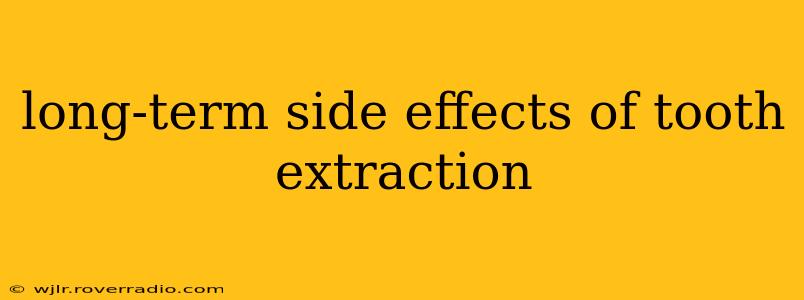Tooth extraction, while a common procedure, isn't without potential long-term consequences. While most people recover fully and experience only short-term discomfort, understanding the potential long-term side effects is crucial for informed decision-making and proper post-operative care. This guide delves into the possible long-term ramifications of tooth extraction, addressing common concerns and providing valuable insights.
What are the common long-term side effects of tooth extraction?
The most prevalent long-term side effects are often related to the extraction site itself and the surrounding bone and tissues. These can include:
- Dry Socket: While technically a short-term complication, severe or recurrent dry socket can lead to prolonged pain and delayed healing, impacting long-term oral health.
- Bone Loss: The jawbone naturally remodels, and the absence of a tooth can accelerate this process, leading to bone loss in the extraction site. This can affect the stability of adjacent teeth and the overall structure of the jaw.
- Changes in Bite: The loss of a tooth can alter the bite (occlusion), potentially leading to TMJ (temporomandibular joint) disorders, headaches, and discomfort in the jaw.
- Sinus Problems (for upper teeth): Extractions of upper teeth, particularly molars, can sometimes lead to communication between the maxillary sinus and the mouth, potentially resulting in sinus infections or other sinus-related issues.
- Nerve Damage: While rare, damage to nerves during extraction can cause numbness, tingling, or altered sensation in the lip, chin, or other areas of the face. This can be temporary or, in some cases, permanent.
Can tooth extraction cause long-term pain?
While immediate post-operative pain is expected and usually resolves within a few days to weeks, persistent or recurring pain can be a long-term side effect. This persistent pain might stem from:
- Incomplete healing: Infection or other complications that hinder the healing process can lead to chronic pain.
- Dry socket: As mentioned above, severe or recurrent dry sockets can prolong pain significantly.
- Nerve damage: Nerve damage from the procedure can result in ongoing numbness or pain.
- TMJ disorders: Changes in bite due to tooth loss can strain the temporomandibular joint, leading to long-term pain in the jaw.
What are the risks of not replacing missing teeth after extraction?
Failing to replace missing teeth after extraction can have several significant long-term consequences:
- Increased Bone Loss: The jawbone requires stimulation from the tooth root to maintain its density. Without a tooth, bone resorption (loss) accelerates, leading to a shrinking jawbone.
- Shifting Teeth: Adjacent teeth can drift into the gap left by the missing tooth, affecting the alignment of your bite and potentially causing crowding or misalignment.
- Difficulty Chewing and Speaking: Missing teeth can make chewing and speaking more challenging, impacting overall quality of life.
- Increased Risk of Gum Disease: The space left by a missing tooth can make it harder to clean properly, increasing the risk of gum disease.
How can I minimize the long-term side effects of tooth extraction?
Careful planning and diligent post-operative care are essential in minimizing the risk of long-term complications. This includes:
- Choosing a qualified and experienced dentist or oral surgeon: A skilled professional minimizes the risk of complications during the procedure.
- Following post-operative instructions carefully: Adhering to your dentist's recommendations for pain management, oral hygiene, and diet is crucial.
- Maintaining excellent oral hygiene: This prevents infection and promotes proper healing.
- Considering tooth replacement options: Replacing missing teeth promptly helps prevent bone loss and other long-term complications.
What are some long-term complications associated with wisdom teeth extraction?
Wisdom teeth extractions, while often necessary, carry unique potential long-term risks:
- Nerve damage: The proximity of nerves to wisdom teeth increases the risk of nerve damage during extraction.
- Dry socket: The larger extraction sites associated with wisdom teeth can make dry socket more likely.
- Infection: Infections can occur if the extraction site is not properly cleaned and cared for.
Disclaimer: This information is intended for educational purposes only and should not be considered medical advice. Always consult with a qualified dentist or oral surgeon for any concerns about tooth extraction or its potential long-term effects. They can provide personalized advice based on your individual circumstances.
